- Home
- Sally Wentworth
Sally Wentworth - Garden of Thorns
Sally Wentworth - Garden of Thorns Read online
Sally Wentworth - Garden of Thorns
Was Kirsty's dream destined to fail?
All Kirsty wanted was to get her younger sister away from London and live a new life in their new home, Briar Cottage.
But someone in the village wanted to drive them away—for surely all the mishaps that overwhelmed them weren't coincidences?
One thing was certain: they were not welcomed by the aristocratic squire, Gyles Grantham. But Kirsty couldn't care less. He was the most offensive, domineering man she'd ever met!
CHAPTER ONE
The door of Briar Cottage was standing wide open, and Kirsty's heart sank as she went inside and saw that there were already a lot of people gathered there, some still looking round the house, others standing about waiting for the auction to start. Briefly she considered going over the place again, but then rejected the idea; she had looked over it thoroughly on her earlier visit a week ago and knew the details in the prospectus almost off by heart, so carefully had she studied them. From the hall she crossed to the sitting-room, remembering that the levels were different and that you had to step down into the room. Two men were examining the dirty, soot-stained tiles of the fireplace, but Kirsty went past them to the latticed window and sat on the deep window-seat to look out at the garden. There was little to see, of course, just a tangled, overgrown expanse of weeds and grass beneath the gnarled old fruit trees, their leafless branches bent and swaying before the icy February wind. It looked completely dreary and dismal.
Kirsty shivered as the wind found its way through the broken window-panes, and she turned back into the room. This, too, was in a terribly neglected state; plaster flaked from the walls and in the far corner a damp patch had discoloured the ceiling, although most of it was concealed by hanging cobwebs. The woodwork, as in the rest of the cottage, was painted a muddy chocolate colour, and she guessed that the previous owner must have got hold of a job lot of paint
and just slapped it on. It all looked terribly depressing, and for a moment she wondered what on earth she was doing here; she must be mad to even contemplate realising their capital, which had been so carefully invested, and spending it all on this decrepit old place. It would take so much work to get it decent, be a total time- and energy-consuming task.
She gave herself a little shake; that was what she wanted, wasn't it? The whole idea of buying a house with some land that could be made productive was that she could get Penny away from London and give her something to work at and look forward to. And she was desperate to find somewhere. She had been looking for nearly three weeks before she found Briar Cottage, and although it was in a far worse condition than she had been looking for, she had enough imagination to see that once the place had been put in order, the cottage, with its low-hanging thatched roof, could be a delightful house to live in, and, most important of all, the three acres of garden would provide them with a livelihood. :
But by far the most urgent problem was to get Penny away from the ruinous influence of the crowd she had got mixed up with recently, Kirsty still shuddered at the memory of having to sit in a court and hear the magistrates try her sister. Only just nineteen, and younger than Kirsty by nearly three years. Penny had got involved with a youth she had met soon after leaving school and. had been completely besotted by him. It was obvious from the young man's moody, sullen character that the relationship would lead to nothing but disaster, and Kirsty had done her best to persuade Penny to give him up, but this had only led to rows until Penny had walked out of their apartment without saying where she was going. She was over eighteen, there wasn't a thing Kirsty could do about it, and she hadn't seen Penny again until the police had called a month ago in the early hours of the morning to say that the youth had been caught while burgling a house and that Penny had been waiting for him in the getaway car and had also been arrested. Frantic with worry, Kirsty had gone to bail her sister out and had found her frightened and extremely chastened. The younger girl had sworn that she hadn't known her boyfriend was committing a crime; he'd merely told her to wait while he visited a friend, and Kirsty had believed her. Fortunately the magistrates had too, but only after probationary reports, and they'd given her a solemn warning about her future conduct that had made a distinct impression.
A great many things had come to light at the trial, among them that the man had been in prison before and also that he was already married. That had really hint Penny, who'd been convinced they would eventually get married,, and ever since she had been in a state of deep depression, shutting herself away and of ten having bouts of prolonged weeping.
After the bearing the police Inspector had taken Kirsty aside and advised her to get Penny right away, 'We can't prove it,' he told her, 'but there's a strong possibility your sister's boy-friend is passing drugs. Get her as far away from him as possible, because he's bound to come looking for her when he gets out of prison. And find her something else to think about, something that will keep her completely occupied.'
There was some bustle in the doorway and Kirsty saw that people were moving out into the hall. She followed the two men who had been looking at the fireplace and heard one mutter something about, 'The wall's plenty thick enough for an inglenook', before
she gave her attention to the auctioneer. He was standing on the stairs to get a better view, but as there were so many people some had to go and stand on the upstairs landing. From her position at the back Kirsty looked at the people, wondering how many of them were serious prospective buyers. There was a young couple with excited faces, the girl with a brightly new wedding ring on her finger, who pushed eagerly to the front, and near the auctioneer at the foot of the stairs there was a youngish man in an expensive-looking camel overcoat who carried a documents case under his arm. But there was no time to look further because the auctioneer had started to speak’ giving details of, the size and age of the property’
The first few bids came tentatively. Ten thousand pounds. Twelve thousand from the young couple. Then they came more quickly as a man who looked like a farmer joined in to raise it to fifteen before someone on the landing out of her sight raised it again. The young couple dropped out, their face crestfallen, while the farmer and the unknown bidder fought it out to twenty thousand. This was too much for the farmer, who gave a shrug of defeat. The portly auctioneer asked for any other bids and lifted his hammer, thinking it was all over. Kirsty raised her voice for the first time.
'Twenty-one thousand,' she said firmly.
There was a murmur among the onlookers and they turned to peer over their shoulders at the tall, slim girl whose shoulder-length fair hair framed an attractive face with clear, pale-violet eyes ;and well-shaped mouth.
'Twenty-one and a half.' The unseen male voice from the landing again.
'Twenty-two.'
The price went up by five hundred pounds at a time to twenty-six thousand, the man sounding angrier by each bid, until he dropped out. Kirsty looked at the auctioneer expectantly, her face flushed, her pulses racing with excitement. But then there was a movement near the stairs as the well-dressed man raised his hand to attract attention.
'Twenty-seven,’ he said decisively.
Kirsty groaned inwardly; she had been so certain it was hers, and at a reasonable price too. 'Twenty-eight! she said dearly, hoping that the new bidder would be put off.
But he refused to be intimidated and took the price up to thirty-one thousand before he showed any sign of hesitation. Kirsty dug her nails into her palms. Her limit had been thirty thousand; she would need the rest of their capital to repair the house and dear the garden. If she went any higher it would leave them very short. But gardening was the one thing that Penny had ever really
loved, and it had been the only scheme that had roused her from her misery and apathy and for which she had shown the slightest enthusiasm. I've got to have this place, Kirsty thought desperately, it might take me months to find another. 'Thirty-two,' she said defiantly, wiping away the smile that had started to show on the other bidder's face.
He seemed to wrestle with himself, then said, albeit reluctantly, 'Thirty-three.'
The crowd looked at Kirsty expectantly. 'Thirty-four,' she called out recklessly.
The man glared at her angrily, then shook his head at the auctioneer. The hammer came down at last. Briar Cottage was hers! Kirsty felt a wave of dizzy relief and' had to lean back against the flaking wall for support. The other people glanced at her curiously as they began to depart, some of those who had hoped to buy the cottage giving her dirty looks as they passed, but Kirsty was blind to all of them.
Coming down the stairs, the auctioneer crossed to her and said grimly, 'I trust you are able to meet your bid, young lady?'
Anger flicked her at his patronising tone and she straightened up. 'Certainly,' she replied coldly. 'I have a covering letter from my bank to verify that I have the amount required in my account. I'll give you a cheque for the ten per cent deposit now and pay the balance just as soon as the exchange of contracts can be completed.' .
He took the letter from her and read it through.
'How soon do you think I'll be able to move in?' Kirsty asked him anxiously.
'As you're paying cash it's merely a matter of paperwork.’ Three weeks at the most, I should think.' He looked at her in open curiosity. 'But surely you intend to have the cottage repaired and decorated before you move in, Miss Naylor? I can give you the names of some local firms who are very reliable.' He fished in his pocket and held out two or three trade cards.
'Thank you,' Kirsty said firmly, 'but I doubt if I shall be needing those. We intend to do all the work ourselves.'
'Oh, I see.' The man's brow cleared. 'You're about to be married. Well, tell your fiancé to get in touch with us and we'll get things moving straight away.'
Kirsty glared at the auctioneer, annoyed by his pompous assumption that she was incapable of acting for herself. 'No, I'm not getting married,' she snapped at him, her violet eyes frosty. 'I'm buying this place myself, and I'm telling you new to start work on the transaction at once. Here's the .name and address of ray lawyers; I want this to go through as promptly as possible, you understand?'
The poor man looked completely taken aback, but recovered quickly; after all, she was a buyer and was indirectly paying his fees. 'I beg your pardon, Miss Naylor. Our firm will, of course, do everything in its power to make the transfer as quick and as smooth as possible.'
He motioned her to precede him out of the hall and Kirsty watched as he locked the heavy wooden front door. Looking up, she stared at the dirty dormer windows, almost hidden beneath the ragged thatch and the thick stems of a climbing rose. Vaguely she wondered what Colour it was, and then felt the first thrill of ownership as she realised that, in a few months time she would be here, living in the cottage, and would find out for herself. '
She turned to walk down the narrow path ahead of the auctioneer. At the gate she stopped and said, 'That man who bid against me at the end—the one carrying a briefcase. Who was he?'
'Oh, that was a junior in the firm of lawyers who act for the Squire.'
'The Squire?'
'Gyles Grantham. He owns all the land hereabouts. His house is further along that lane that goes down the side of your property. It's called Notley Manor.'
He shook her hand and walked towards his big maroon Jaguar. Kirsty went the other way to her small yellow Mini. But she didn't drive off immediately, instead she sat and gazed unseeingly through the windscreen. She'd done it! She'd really done ill Now she and Penny were the owners of a tumbledown cottage and a piece of land that they hoped to turn into a productive garden where-they would cultivate herbs to sell commercially. It wasn't a decision they had taken lightly, they had talked round and round it for hours and studied books from the library to try and find out whether it would be a viable proposition. But you can only learn, so much from books, and the only way they would ever really know would be by finding out for themselves. And Penny had been so keen, she had really got above her depression and once more looked like the girl she used to be. And that was worth giving up a lot for. Because buying Briar Cottage meant that Kirsty would have to sacrifice a lot: her comfortable modern apartment in Swiss Cottage, the job she loved as a librarian in a well-known teaching hospital, and most of all her blossoming friendship with Simon Granger, whom she'd met when he came to the hospital, as a surgeon working for his fellowship.
Kirsty sighed a little, but then tried to shake off the momentary feeling of depression. If they were going to make, this enterprise succeed, they would need all her drive and enthusiasm, there could be no half measures, no wishful looking back at what might have been. And besides, if Simon cared enough they would-find a way to keep on seeing each other no matter how much distance separated them.
Right now her biggest worry was going to be finding enough capital to get them started. By spending four thousand over their limit they would have nothing to fall back on to cover any unforeseen difficulties. The money was from the estate left equally between them on the death of their parents many years ago. It had been carefully invested for them by their grandparents, who had brought them up and had paid for a good education, but now that they were of age Kirsty felt justified in using the money in this way. She frowned rather worriedly for a moment bat then straightened her shoulders, her chin defiant. Well, right or wrong, she had burned her boats and there was no going back now.
Starting the car, she drove slowly along the road. Briar Cottage was almost at the edge of the village of Notley, and she passed several other cottages before the road widened and she came to a large village green. On the left was the ancient village church, half hidden by trees, its stone tower topped by a spire, and it was hardly necessary to look at the weathrcock on the top to know that this freezing cold wind was coming from the north. The wind had kept the villagers indoors and there were no customers for the post office-cum-general store or the greengrocers further along, although there were several cars in the car-park of the whitewashed pub with its higgledy-piggledy roofline denoting later additions to the original building. Its sign creaked and groaned in the strong wind and Kirsty could just make it out: The Mops and Brooms. What an odd name! There were a few largish Georgian-style houses "on the other side of the green, then arrow of terraced cottages, a garage, and a small estate of modern' houses that seemed completely out of place before she was through the village and heading for the main road to London, eager to get to the apartment and tell Penny all about their new home.
The next few weeks were the most hectic that Kirsty had ever known. She gave in her notice from her job straight away, and luckily her employers were most considerate and allowed her to have time off to visit her lawyer and her bank to make all the financial arrangements. Her Mini she traded in for a much more practical van, and then she had to arrange to give up her apartment and start packing all their possessions.
"Whew, I never realised thal moving was such a load of work,' she remarked to Simon when they managed to meet for a quick coffee in the staff canteen one afternoon. 'I spent the whole of my lunch hour today queueing up at the post office and filling in forms to notify them of my change of address.'
'Have you got a moving date yet?'
'Yes, the first of March: That's next Thursday. Now all I've got to do is to find a removal firm who aren't booked up for that day, although it's very short notice,' she added rather worriedly.
'Look, why don't you leave it until the Saturday? I've got that weekend free and I'll get hold of a large van so that we can do the move ourselves. Rory and Philip are free too,' he added, mentioning two of his fellow surgeons. I'm sure they'd be pleased to give us a hand. Tell you what, we could bring our sleep
ing-bags with us and stay overnight, perhaps make a start on the garden for you on Sunday.'
‘Oh, Simon, could you? That would be lovely. I've been dreading the actual move.' She looked at him gratefully.
He reached out to cover her hand, his hazel eyes under his mop of longish brown hair smiling into hers. 'For you—anything.'
Kirsty turned her hand so that he could hold tightly to his. She liked him so much; he was always gentle and kind and great fun to be with, seldom serious, although he was reputed in the hospital to be an extremely good doctor with a great future in surgery. Not that you'd ever think it to look at him, she thought with a little smile, for he hated wearing a suit and was far happier in sweater and jeans, but then so were most of the young doctors and medical students at the hospital; now only the more senior members of the staff appeared in business suits every day.
In the end their moving day turned almost into a party. Another recently married doctor had come to help and had brought along his wife, which made seven of them. Kirsty had everything packed ready in tea-chests and boxes when they arrived very early on the Saturday morning with the van. And what a van! Simon had borrowed one belonging to the hospital band, which they used to transport themselves and their instruments. It was bright blue and had, 'If music be the food of love, play on', emblazoned on the sides in huge yellow letters. Added to which some amateur artist had lovingly painted flowers and trees in every available space. Kirsty burst out laughing when she saw it and then the men proceeded to get in each other's way as they loaded the furniture with a great deal of joking and rude comments, until Penny said rather tardy! 'I hope they're better doctors than they are removal men !'
At last they were ready and Kirsty hurried to lead the way in her own van with no time for a last look around the apartment, no time to take leave of her old life before she began the new. But perhaps it was better this way. She glanced at Simon sitting next to her with Penny squeezed in beside him on the other side. And perhaps he had intended it to be like this; he, more than anyone, knew just how sad she was to leave.

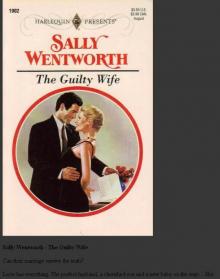 The Guilty Wife
The Guilty Wife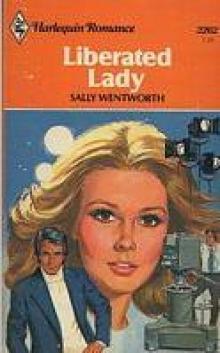 Sally Wentworth - Liberated Lady
Sally Wentworth - Liberated Lady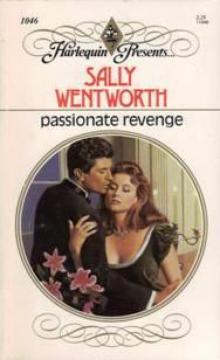 Passionate Revenge
Passionate Revenge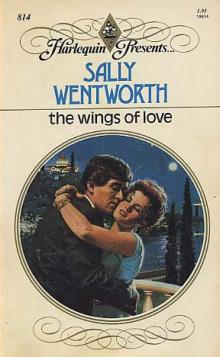 The Wings of Love
The Wings of Love Sally Wentworth - Tiger in His Lair
Sally Wentworth - Tiger in His Lair Semi-Detached Marriage
Semi-Detached Marriage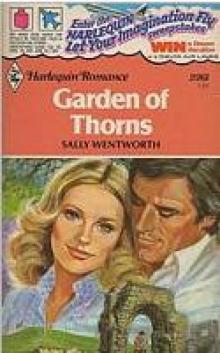 Sally Wentworth - Garden of Thorns
Sally Wentworth - Garden of Thorns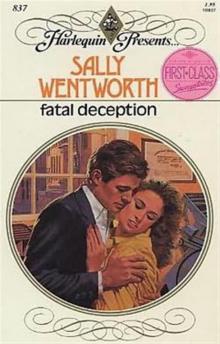 Fatal Deception
Fatal Deception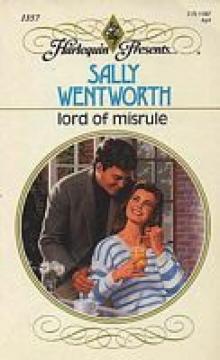 Lord of Misrule
Lord of Misrule Sally Wentworth - Yesterday's Affair
Sally Wentworth - Yesterday's Affair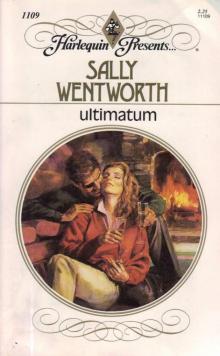 Ultimatum
Ultimatum To Have And To Hold (Mills & Boon Vintage 90s Modern)
To Have And To Hold (Mills & Boon Vintage 90s Modern)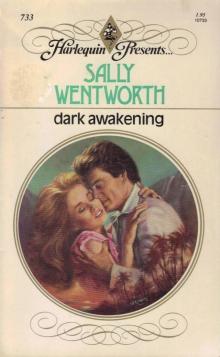 Dark Awakening
Dark Awakening Sally Wentworth - Conflict In Paradise
Sally Wentworth - Conflict In Paradise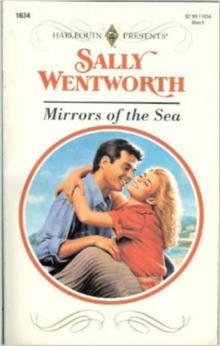 Mirrors of the Sea
Mirrors of the Sea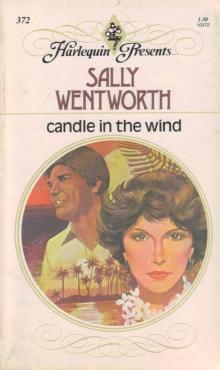 Candle in the Wind
Candle in the Wind Sally Wentworth - Set the Stars on Fire
Sally Wentworth - Set the Stars on Fire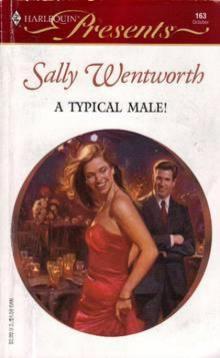 Sally Wentworth - A Typical Male
Sally Wentworth - A Typical Male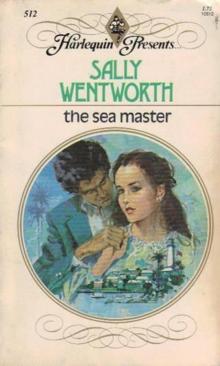 Sally Wentworth - The Sea Master
Sally Wentworth - The Sea Master